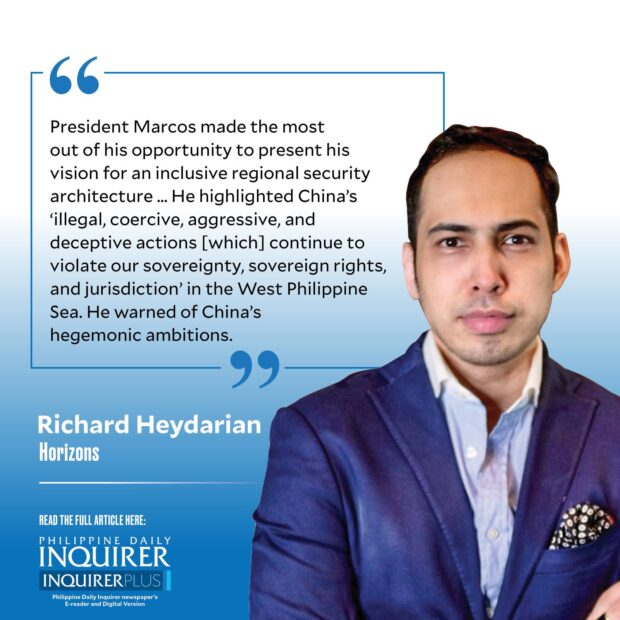Zelenskyy, Marcos, and rules-based int’l order

Last week, President Marcos became the first-ever Filipino leader to deliver the keynote speech at the Shangri-La Dialogue in Singapore. As Mr. Marcos correctly pointed out, his selection as this year’s keynote speaker was “a recognition that there are [major] challenges that are facing the Philippines,” namely the increasingly perilous maritime spats in the West Philippine Sea.
It’s safe to say that it’s also a recognition of our growing importance as a rising middle power in the Indo-Pacific as well as our principled resistance to Chinese aggression.
Back in 2018, I witnessed how Indian Prime Minister Narendra Modi essentially debuted his country’s emergence as a global power during his keynote speech at the vital dialogue. A year earlier, then Australian Prime Minister Malcolm Turnbull leveraged the same privilege speech to project his country as a responsible “bridging power,” which would transcend the dictates of superpowers and instead stand in solidarity with other medium- and small-sized nations.
In fairness, Mr. Marcos made the most out of his opportunity to present his vision for an inclusive regional security architecture. He astutely recognized the need to not significantly deviate from the hedging stance of majority of Southeast Asian nations by, inter alia, emphasizing how, despite our treaty alliance with America, he is not fully aligning with any superpower against another since “[i]t’s never a choice” and that both the United States and China are “important” for regional peace and prosperity.
Nevertheless, he highlighted China’s “illegal, coercive, aggressive, and deceptive actions [which] continue to violate our sovereignty, sovereign rights, and jurisdiction” in the West Philippine Sea. He warned of China’s hegemonic ambitions via achieving “determining influence over the security situation and the economic evolution of this region,” thus the need for the “stabilizing presence of the United States” as a balancing counterforce and foundation for “regional peace.”
Meanwhile, Ukraine’s warrior-president Volodymyr Zelenskyy, donning his trademark olive green t-shirt, made a surprise appearance at the event, where he invited regional leaders to attend a Global Peace Summit in Switzerland later this month to help end Russian aggression against his war-ravaged nation. He also implicitly exposed China’s pretension to “neutrality” by calling on the Asian power to act responsibly rather than aiding Russia.
Subsequently, the Ukrainian leader made a historic visit to Manila to upgrade bilateral ties, thank the Philippines for its diplomatic and moral support throughout the past two years, and invite our leaders to the peace summit. Together, Zelenskyy and Mr. Marcos have stood as champions of a rules-based order in direct opposition to the “might is right” logic of Russian and Chinese contemporary statecraft.
But as experts such as Ziad Haider of McKinsey and Co. have correctly pointed out, we live in a “broken-rules” international order. The US-backed rules-based international order is more like the “Holy Roman Empire,” which was neither Holy and Roman (it was Austrian!) nor truly an “empire” (barely in control of Germanic statelets). Our current global system is neither “rules-based” nor particularly “ordered,” but instead deeply fragmented and compromised by double standards and inconsistencies of world powers
In fact, the Philippines and Ukraine have aligned with nations that have either flagrantly violated international law and/or threatened international judicial bodies. Authoritarian superpowers—the biggest threats to democracy and global peace—have deftly exploited real and perceived hypocrisy of Western powers to their own advantage. As spokeswoman of Russia’s foreign ministry Maria Zakharova recently argued, “Washington fully supported, if not stimulated, the issuance of ICC (International Criminal Court) warrants against the Russian leadership [but] the American political system does not recognize the legitimacy of this structure in relation to itself and its satellites.”
She was, of course, referring to the surreal situation whereby the Biden administration at once enthusiastically supported the ICC’s warrant of arrest against Russian president Vladimir Putin, but threatened the same body with sanctions when issued warrants of arrest against a key US ally in the Middle East over the ongoing conduct of war in Gaza. Responding to the recent conviction of his chief election rival, Donald Trump, US President Joseph Biden correctly emphasized that “no one is above the law.” But we can’t have a “rules-based international order” when no one (is supposed to be) above the law, but laws are effectively above some more than others.
rheydarian@inquirer.com.ph




















